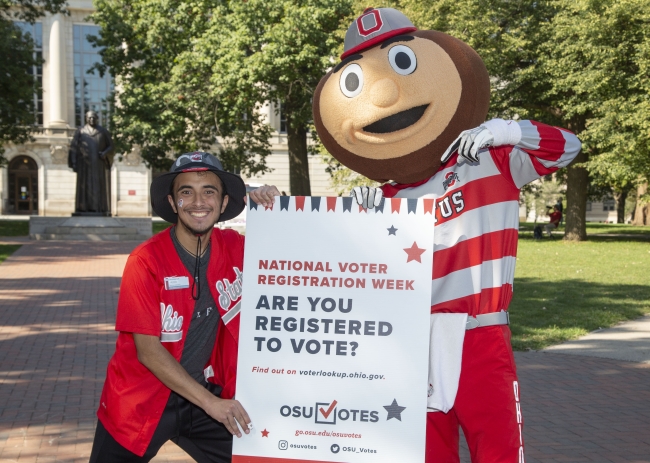You have /5 articles left.
Sign up for a free account or log in.

A student and Ohio State University mascot Brutus Buckeye implore students to vote.
Ohio State University
Republican legislators across the U.S. have rallied for laws to limit or deter college students, who typically skew liberal, from voting in the district where they go to college. Most recently, Wisconsin lawmakers proposed a bill, which never advanced, that would have required the state’s university system to inform all incoming students about how to vote absentee in their home states; the state had the highest youth voter turnout in the nation in the November 2022 midterm election. Bills that seek to disqualify student IDs from counting as a form of identification at polling places have also become increasingly common.
The legislative push illuminates an intriguing question: Are students more likely to vote where they go to college, or at their parents’ home or other permanent address? A number of factors may influence the choice: which community feels more like home, which region they are more knowledgeable about, or even where they feel their vote is more important.
But, according to Meagen Rinard, assistant director for community and civic engagement at Ohio State University, one factor is by far the most important to students: convenience. Students typically opt to vote wherever it is easiest, she said, whether that means voting absentee in their home district or at the polling place on OSU’s campus.
Historically, Ohio is one of the nation’s most important battleground states, though former President Donald Trump won the state by significant margins in both 2016 and 2020. At the same time, the voting rate at OSU trends about 10 percentage points higher than the national average for universities.
Most students come to OSU without necessarily considering where they might vote, Rinard said; many mistakenly assume that they’re not allowed to vote at the address where they go to college, though it’s entirely legal if they live on campus.
“We’re actually tabling at orientations right now, and it’s mostly students and parents asking, can they [vote in OSU’s district]? And then we provide them with the information,” she said. “Normally, people want information about both [options].”
Data indicate that it may be easier for students to vote on campus. The National Study of Learning, Voting, and Engagement (NSLVE), which is located at Tufts University and evaluates the habits of student voters across the country, found that in the 2016 general election out-of-state students who were registered to vote at their college address were more likely to actually cast a ballot than college students registered to vote in their home state.
“It was just more convenient to vote where they lived for students who were residential on a campus,” said Adam Gismondi, the NSLVE’s director.
Young people came out to vote in record numbers in the 2020 election, playing a major role in President Biden’s win over Donald Trump, and are likely to influence the upcoming election as well. Currently, Biden is polling ahead of Trump by 23 points among college students who are likely to vote in the upcoming election, according to research by the Institute of Politics at Harvard Kennedy School—though various polls of young voters in recent months have shown vastly different projections. Dissatisfaction with Biden, especially among progressive students upset by his handling of Israel’s war in Gaza, may also impact turnout. But while campaigns to vote “uncommitted” in the Democratic primary in protest of Biden’s policies gained some traction, only 8 percent of students listed foreign policy as their top national issue in the Harvard poll.
In the 2020 presidential election, about 46 percent of college students had a polling place on their campus, according to research from Duke University’s master’s in interdisciplinary data science program. Four-year institutions were more likely than two-year institutions to host a polling place. In some places, students had to overcome major obstacles in order to vote; in New York, for instance, students struggled to reach the polling place closest to their campus due to distance, accessibility issues, difficulty figuring out where to vote or other reasons.
Other factors, such as when an election takes place—many primaries occur over the summer, when college students are not typically in school—or whether the university gives students election day off, can also contribute to whether voting on campus or at home feels more convenient to students.
Making Votes Count
While many students choose to vote where it is easiest, others select their polling place for political reasons. Connor Effrain, the president of the University of Florida College Democrats, said he feels it is important for UF students to vote at the university.
“Whenever we register people to vote on campus, we often get people saying, ‘Oh, we are registered to vote already.’ The second question we’ll ask is, ‘But are your registered to vote in Alachua County?’” he said. “We often are in these types of conversations where we have to convince them, ‘You should register to vote in Alachua County.’”
UF students make up nearly one-fifth of the county’s population of 278,000, so they hold a certain amount of sway. Effrain recalled a 2022 ballot initiative to change the county charter that was opposed by the county’s Democrats and passed by just a few hundred votes. He believes that student voters easily could have made the difference in that election—and that they could make a difference this year, when the matter will appear on the ballot once again.
“This is a huge reason why you should be registered to vote in the county where you’re going to be spending eight months out of a year,” he said.
But Effrain noted that he often gets pushback from students who feel obligated to vote in their hometown, especially those who live elsewhere in Florida and are already registered to vote there. Freshmen who are not yet registered to vote and students from outside Florida—especially from blue states—are easier to convince, he said. It helps that, as at OSU, UF has a centrally located polling place, making it convenient to vote on campus.
Though convenience is certainly an important factor, Gismondi, the NSLVE director, said that judging from his team’s research and his own personal observations, it is not uncommon for students to choose where to vote based on politics.
“Voting can be a social behavior. If your peers are going to vote and they’re registering to vote and you all do it in one spot, that increases some level of interest and perhaps makes you more willing to actually go vote,” said Gismondi. “This is anecdotal but in my observed behaviors that I see out there, students in the last handful of years have become more politically savvy than they have been, so I think there’s just more attention across the board in society around politics right now.”








